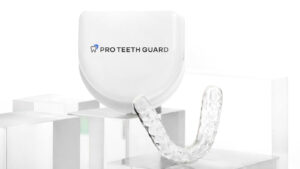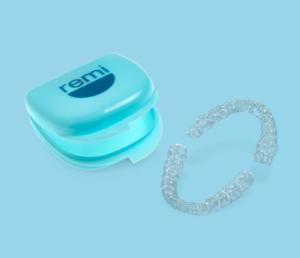Night guards are proven to protect our teeth. Even the biggest skeptics in the scientific literature agree they have benefits against tooth ware. But an ill-fitting night guard carries an additional risk – unwanted shifts. Dentist-made night guards avoid this issue, but they will also set you back a few thousand dollars. Naturally, most consumers are looking for more affordable alternatives.
Can a well-chosen, direct-to-customer night guard effectively maintain teeth alignment? My position is that with careful selection and proper maintenance, it is possible. And easier than you think. This article is all about answering this question.
The Role of Night Guards in Dental Protection
Night guards are dental devices worn during sleep to prevent teeth grinding and clenching, known as bruxism. Unlike mouth guards, chin straps, or nasal strips, which target sports safety or sleep apnea, night guards focus solely to protect dental health and prevent jaw injuries.
They work by creating a physical barrier between the upper and lower teeth, absorbing and redistributing the force of the grinding. Typically made from soft or hard acrylic, night guards come in various designs. Over-the-counter options offer standard fits, while dentist-provided guards are tailored to individual dental impressions, ensuring a precise fit and often greater comfort and protection.
Can a Night Guard Prevent Teeth From Moving?
Yes, a night guard can protect teeth from moving if it evenly distributes the pressure during grinding or clenching exerted on teeth and jaw. This distribution helps maintain teeth alignment and prevents shifting. Although night guards do not treat conditions like bruxism and temporomandibular joint disorders (TMJ), they safeguard the teeth.
Nigh guard offers relief when they reduce wear on teeth and jaw. Additionally, night guards prevent the worsening of existing dental issues. Additionally, their use contributes to better overall oral health by protecting against the long-term effects of teeth grinding and jaw clenching.
Potential Risks: Can a Night Guard Shift Your Teeth?
Generally, the risks of using a night guard are minimal. These devices are designed to protect teeth, not shift or alter their positions, unlike rapid palatal expanders (RPE) or dental prostheses intended for orthodontic adjustments.
It’s crucial to ensure the night guard fits correctly and is regularly checked for wear or distortion, as these factors can inadvertently lead to slight shifts in teeth alignment if left unaddressed. Material bending over time, changes in teeth grinding patterns, or improper insertion and removal of the guard are common maintenance causes. However, improper fit is the main cause of teeth shifting caused by night guards.
How Improperly Fitted Mouth Guard Can Affect Teeth Alignment?
Inaccurate dental impressions may result in uneven pressure distribution on the night guard. When the teeth night guard does not align well with the dental structure, it applies pressure to certain teeth more than others. Over time, this imbalanced force can cause those teeth to shift, altering the bite and alignment.
In a similar way, night guards that provide inadequate protection, are too loose, too tight, or are overused without proper maintenance can also contribute to this issue. The key is a precise fit. Otherwise, the guard might do more harm than good.
The Difference Between Night Guards and Orthodontic Devices
Night guards are commonly mistaken for other orthodontic devices, but they all differ in function. For example, a mouth guard is not a retainer as it isn’t meant to keep teeth in position. Instead, night guards protect teeth and jaw from grinding and clenching during the night.
The same goes for other orthodontic devices, such as braces and aligners. They all look similar to an inexperienced eye, but their function is different. You can’t effectively use night guards for bite correction or braces and retainers to prevent bruxism symptoms. Improper use is more likely to cause side effects than help.
Choosing the Right Night Guard: Key Considerations
Can a night guard shift your teeth when it is chosen properly? Unlikely. That’s why selecting the appropriate night guard is crucial for effective protection against clenching and grinding while ensuring it doesn’t misalign or move teeth.
Comfort is paramount – the guard should feel snug but not overly tight, allowing for natural mouth movements. While cheaper options may be tempting, they often compromise on the quality of build and materials. Look for night guards made of non-toxic, durable substances that withstand regular use. But most of all, you must ensure an almost perfect fit to distribute pressure evenly and avoid shifting teeth.
I have tried and tested multiple night guards, carefully evaluating their performance. Our top-rated mouth guards all fit these criteria. Two options that excel in comfort, fit, durability, and cost-effectiveness of dental protection are presented below.


- Read our in-depth Pro Teeth Guard review
- Read our in-depth Remi night guard review
Custom-Fit vs. Over-the-Counter Mouth Guards
Custom night guards, made by dental professionals, offer a precise fit, reducing the risk of negatively impacting teeth alignment. However, they often come with a high price tag. Alternatively, direct-to-customer custom-fit night guards offer a middle ground – they provide a personalized fit at a reduced cost compared to professional ones.
Over-the-counter teeth guards, while the most affordable option, lack the exact fit of custom options, potentially leading to issues with teeth shifting if not chosen carefully. When compared to professional custom night guards, they could be considered as a temporary alternative, but direct-to-customer custom-fit guards are clearly the best option.
Tips for Ensuring a Proper Fit
- Accurate Impression: Follow instructions meticulously to get an accurate dental impression for your custom-fit guard. It will take some time to learn to mold your mouth guard perfectly.
- Regular Checks: Periodically assess the fit, especially after any dental treatments or changes in your dental health.
- Proper Cleaning: Keep the teeth guard clean to prevent material degradation, which can affect fit over time.
- Even Wear: Ensure the teeth guard wears evenly; uneven wear can alter its fit and effectiveness.
- Professional Feedback: Occasionally consult with a dental professional to verify the ongoing appropriateness of the fit, adjusting as necessary to maintain optimal protection and minimize the risk of shifting teeth.
Maintaining Oral Health with Night Guards
Using a night guard should complement general oral hygiene practices. While using a night guard, maintaining oral hygiene is paramount. Brush and floss teeth thoroughly before inserting the guard, as trapped food particles can lead to decay and gum disease. Additionally, stay hydrated and avoid sugary or acidic beverages before bed, as these can harm tooth enamel and exacerbate oral health problems, especially when wearing a night guard.
Caring for Your Mouth Guard
Proper cleaning of your night guard is crucial for its longevity and effectiveness. Before use, rinse the guard with water to remove any dust or particles. After each use, clean it with a soft toothbrush and mild soap, avoiding hot water, which can warp the material.
For deeper cleaning, occasionally soak the guard in a mixture of cool water and mouthwash or a denture cleaner. It not only disinfects but also helps maintain freshness.
Store your night guard in a ventilated case to prevent bacterial growth. Avoid exposing it to extreme temperatures, as this can affect the shape and fit. Regularly inspect the guard for signs of wear or damage. It’s a mistake to continue using the night guard after it gets some cracks or becomes thinner.
Long-term, it’s advisable to replace the night guard every 6 to 12 months for optimal hygiene and effectiveness. It applies to all types of night guards, even ones made at a dentist’s office.
Monitoring Teeth Alignment with Night Guard Use
Monitoring teeth alignment and bite is vital when using a night guard. Regularly check for changes by observing how your teeth fit together when you bite down. Notice any new spaces or misalignments. Use dental floss to check if gaps between teeth have changed.
Self-assessment in the mirror for alignment and listening for any clicking or discomfort in the jaw during chewing also indicates changes. Observe your bite each morning after removing the night guard. Notice if your teeth align as usual or if any changes occur.
You can also bite down on a thin strip of paper, which should show an even impression pattern across your teeth. If it doesn’t, consider consulting a dental professional.
When to Consult a Dental Professional
If during self-checks, you notice persistent bite misalignment, uneven wear patterns on the night guard, or any discomfort in your jaw, it’s time to consult a dental professional. Changes in how your teeth fit together, increased sensitivity, or new gaps between teeth are also key indicators.
Night guards are often recommended by dentists but these signs might suggest that the oral device you already own, requires some adjustment. It might also mean that there are some more serious teeth issues requiring your attention. Prompt consultation with a dentist ensures that any problems are addressed early.
Professional Fittings and Adjustments for Night Guards
Professional fitting of a night guard ensures optimal protection against teeth moving. Professional fit accounts for each tooth, reducing the risk of uneven pressure that can lead to teeth shifting. A good dentist will tailor the teeth guard’s design to your specific teeth structure to prevent teeth movement.
However, professional fit requires constant adjustments to accommodate changes in your teeth alignment. While direct-to-customer oral devices can be re-fitted at home, professional custom-fit mouth guards will make expensive trips to the dentist quite often.
Addressing Concerns About Teeth Movement
If you suspect your teeth are moving due to night guard use, start by pausing its use temporarily. Observe your bite and teeth alignment over a few days without the teeth guard. If you notice improvements or stabilization in alignment, it’s likely the night guard is at fault for tooth shifting.
In any case, seek a dental professional’s advice to adjust or replace your night guard. In the meantime, continue practicing good oral hygiene and monitor any changes closely to inform your discussion with the dentist.
Conclusion: Balancing Protection and Caution
Night guards offer a crucial balance between protecting our teeth from grinding and the potential for causing teeth movement. When chosen and used correctly, they serve as vital tools for teeth and sleep health. Regular self-monitoring and maintenance are key to ensuring they function as intended without adverse effects.
While professional fittings offer the most precise solution, cost considerations make direct-to-customer options the best alternative. Ultimately, the right night guard, combined with ongoing care and awareness, is an effective teeth protection with minimal risk of teeth movement.




